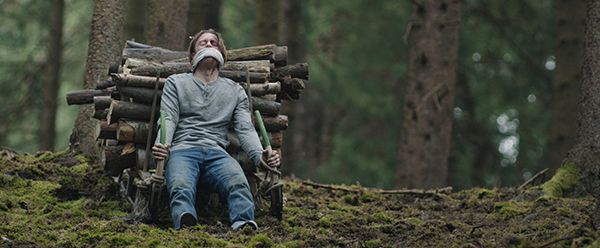Eye For Film >> Movies >> Schlitter: Evil In The Woods (2023) Film Review
Schlitter: Evil In The Woods
Reviewed by: Jennie Kermode

“What is a schlitter?” you might wonder, and I must admit that until I came to review this film for Frightfest 2024, I hadn’t the faintest idea. To keep viewers from being distracted by such curiosity, director Pierre Mouchet introduces one right at the start of this beautifully made but otherwise problematic film. It’s a sort of sled used for transporting lumber down mountain slopes. Curiously, although it was in use for several centuries, and still is used in a handful of places, nobody seems to have invented an anchor or braking system for it, so in that early scene we see young Lucas (Antime Calbrie Ekeloo) straining to hold one back despite it being piled high with logs. He can’t do it, and his failure – which could have been fatal had he not been quick – earns him his father’s wrath. We get the impression that this is far from the first beating he’s endured.
Happiness, for the troubled boy, comes from escaping into the forest to play with his best friend Mathias (Nelson Maerten), but it’s a happiness that can’t last. When Mathias is killed in an accident, Lucas’ father – the man responsible – frightens his son into keeping quiet as he covers it up. No doubt he thinks he’s got away with it – but years later, there will be a reckoning.

The main part of the film takes place when Lucas (now played by Louka Meliava) returns to the village after some years away. He has been estranged from his parents, but now they’re gone, the old family home burnt to the ground. Some of his possessions have survived in the garage and his girlfriend Julie (Léna Laprès) and friend Arnaud (Côme Levin) have tagged along to help him load them into a truck. This turns out to have been a poor decision on their part. Mathias is too obviously disposable, and this is a film in which female characters are essentially treated as chattel. As if in a token nod to the fact that the Eighties were 35 years ago, Julie gets to show a bit of feistiness, but she goes on to prove totally helpless whenever it’s convenient to the plot.
This is not the only ugly cliché in a film which seems to have identified its torture device and then worked backwards with little additional innovation (though the idea that it’s based on a design for a better mousetrap is cute). It establishes a world in which Lucas’ route to redemption depends not on any moral progress (or even just growing up) but through displays of physical strength. More interesting plotlines surrounding his feelings about the accident and the possible hallucination, possible psychic connections they beget are abandoned, and the promise of an early scene in which the two boys play together in an abandoned bunker is never recaptured.
The performances in the film are generally good, with Gilles David particularly impressive as Mathias’ father, and Mouchet handles the interpersonal drama well, with particular attention to the way that young people easily surrender their initiative to confident older folk. There’s some lovely production design in the primary setting and Nicolas Beauchamp’s photography works wonders with the moist air of Vosges forest. With this in mind, one can see its appeal to festival programmers, but aside from the aforementioned issues, it has no narrative depth. Like the schlitter, when it picks up speed, it can only go downhill.
Reviewed on: 26 Aug 2024
















